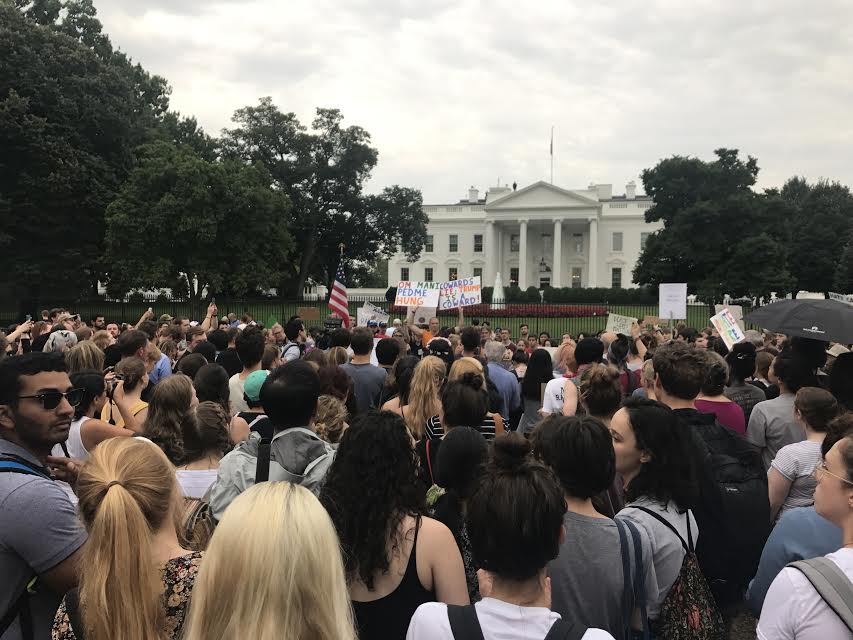By Natalie Schwartz, Naomi Grant, Carly Taylor and Julia Heimlich
Senior staff writers
University of Maryland student groups are pushing for increased diversity initiatives following violence in recent months that has spanned from the campus to the national level.
Student Government Association President A.J. Pruitt said he plans to talk about diversity and inclusion during upcoming legislative sessions, and he wants to propose that all student group leaders go through cultural competency training, as well as develop a response plan in case something like the events in Charlottesville, Virginia happen on the campus.
Pruitt, among other student leaders, said the events in Charlottesville, where a white supremacist rally turned violent, killing one and injuring 19 others, resurface diversity and inclusion issues that have recently affected this university.
[Read more: UMD students join DC protest to condemn white supremacists in Charlottesville]
And citing the fatal stabbing of Richard Collins, a black Bowie State University student, on this university’s campus in May — an incident that is being investigated as a possible hate crime — Pruitt, a senior economics and government and politics major, said he hopes the campus community “can finally get on the front line of this issue and start to make some progress that we really need.”
Residence Hall Association National Communications Coordinator Valerie Kologrivov said that after the Charlottesville violence, she wants to educate RHA executive board members on holding diversity-related dialogue. RHA President Dana Rodriguez said the organization is focusing on creating groups of people in every dorm that know how to “lead constructive conversations” on diversity to make sure students are being educated on campus inclusivity.
Training internal leaders and members in “cultural competency” has been one of RHA’s top priorities, but this year it plans to “have a different type of training for our residents and students,” Rodriguez said.
“RHA has had a long history of trying to encourage diversity, but I think that after the events of this summer, both on this campus and nationally, we have had a renewed need to really re-evaluate those efforts and need to figure out how we can strengthen them to better serve the residents and better serve the entire campus,” Rodriguez said.
The violent white supremacist protests in Charlottesville, as well as multiple race-related incidents at this university, have prompted student groups to speak out against racism and bigotry, and have spurred campus leaders to examine how to address them.
[Read more: President Loh speaks out against “supremacist ideology” of Charlottesville protesters]
This university’s College Republicans President Steven Clark, a junior government and politics major, issued a statement days after the event, declaring “the United States is a great country because of our diversity.”
“Every American has the right to free speech, but we must send a message loud and clear to those who support white supremacy that the vast majority of Americans find their views repugnant and will not condone violence,” the statement read.
This university’s College Democrats President Jake Polce described the Charlottesville events as “incredibly heartbreaking,” saying they showed “racism and bigotry are still very much alive” in the U.S. The group plans to collaborate more with cultural groups on the campus, such as the Political Latinxs United for Movement and Action in Society and this university’s NAACP chapter, he added.
The Graduate Student Government echoed similar sentiments, pledging to fight against white supremacy, terrorism and injustice in Charlottesville.
“Here at the University of Maryland, we know all too well the pervasiveness of white supremacy and its horrific consequences,” GSG public relations vice president Katie Brown wrote in a statement. “GSG remains committed to naming injustice and working to transform the structures, policies, and cultures that enable white supremacy, particularly on this campus and in our state.”
GSG’s executive committee had been discussing diversity initiatives throughout the summer, even before meeting in August, Brown said, adding that the group is ready to put pressure on this university’s administration if it doesn’t follow through with their commitments in a “meaningful way.”
University President Wallace Loh released a statement speaking out against the “supremacist ideology of hate, bigotry and violence” he said occurred in Charlottesville. That followed another statement he released in response to Collins’ death, announcing that the administration would create a rapid response team to provide support to victims of hate incidents, along with an allocation of $100,000 to the Office of Diversity and Inclusion to support its education efforts. He also announced in June that this university would work with the SGA and the University Senate to consider stricter sanctions in the Code of Student Conduct for hate and bias incidents.
“We are cautiously optimistic to see the university for once being a little proactive,” Brown said.
Loh’s actions came after a noose was found in the kitchen of the Phi Kappa Tau chapter house in April, which University Police are investigating as a hate bias incident. In earlier months, white nationalist posters were reported throughout the campus and were also labeled as hate bias incidents.
While some have criticized the administration’s delayed response to these events, student leaders like Pruitt are taking matters into their own hands. Pruitt, joined more than 50 other student body presidents across the United States in signing a letter supporting the University of Virginia — where the white nationalists began their protest — and condemning “violence, racism, white supremacy, bigotry, and acts of terrorism.”
“What’s important is we don’t stop there, we don’t just end with a message, but we really start taking some action on our campus and that’s what I’m excited to do over the next year,” Pruitt said.
For RHA Vice President Tzvi Glazer, promoting general safety on the campus is the best course of action.
“We will not abandon our people on campus,” said the senior government and politics and sociology major. “We are together, we are a community, we are a family … and we will do our best to create that atmosphere and remind people of that.”



